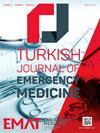葡萄糖酸钙治疗高钾血症的效果
IF 1.1
Q3 EMERGENCY MEDICINE
引用次数: 2
摘要
目的:静脉(IV)钙盐被常规推荐作为严重高钾血症紧急治疗的心脏保护疗法。然而,这一建议的证据水平较低,而且是道听途说。本研究的目的是确定静脉注射葡萄糖酸钙治疗高钾血症的有效性。材料和方法:本前瞻性观察研究纳入了1年以上高钾血症患者和因高钾血症而出现心电图改变的患者。在静脉注射葡萄糖酸钙治疗前后和钾水平正常化后,测量患者的心电图。采用Wilcoxon试验和McNemar试验比较葡萄糖酸盐治疗前后的心电图参数。结果:符合纳入标准的111例患者平均钾值为7.1±0.6 mmol/l。本研究共分析243例与高钾血症相关的心电图病理,其中79例为主要节律障碍,其余164例为心电图参数非节律障碍。静脉注射葡萄糖酸钙治疗患者的非节律性心电图疾病无统计学意义变化(P = 0.125)。然而,79例高钾血症引起的主要节律障碍中有9例在葡萄糖酸钙治疗后得到改善,这一变化具有统计学意义(P < 0.004)。结论:葡萄糖酸钠静脉治疗对高钾血症引起的主要心律失常有一定的疗效,但对高钾血症引起的非心律失常无明显疗效。因此,葡萄糖酸钙可能仅对高钾血症引起的主要节律障碍有效。本文章由计算机程序翻译,如有差异,请以英文原文为准。
The effect of calcium gluconate in the treatment of hyperkalemia
OBJECTIVES: Intravenous (IV) calcium salts are routinely recommended as a cardio-protective therapy in the emergency treatment of severe hyperkalemia. However, this recommendation is supported by a low level of evidence and is anecdotal. The aim of this study is to determine the effectiveness of IV Calcium (Ca) gluconate in the treatment of hyperkalemia. MATERIALS AND METHODS: Patients with hyperkalemia and with the electrocardiogram (ECG) changes due to hyperkalemia over a 1 year period were included in this prospective observational study. Patients’ ECGs were measured, before and after IV Ca-gluconate treatment and after normalization of potassium levels. Wilcoxon test and McNemar's test were used to compare the ECG parameters before and after Ca-gluconate therapy. RESULTS: The mean potassium value of 111 patients who met the inclusion criteria was 7.1 ± 0.6 mmol/l. In this study, a total of 243 ECG pathology related to hyperkalemia, 79 of which included main rhythm disorders, and the remaining 164 were nonrhythm disorders in ECG parameters, were analyzed. No statistically significant changes were determined in patients’ nonrhythm ECG disorders with IV Ca-gluconate treatment (P = 0.125). However, nine of the 79 main rhythm disorders due to hyperkalemia improved with calcium gluconate treatment and this change was statistically significant (P < 0.004). CONCLUSION: IV Ca-gluconate therapy was found to be effective, albeit to a limited degree, in main rhythm ECG disorders due to hyperkalemia, but it was not found to be effective in nonrhythm ECG disorders due to hyperkalemia. Therefore, Ca-gluconate may be effective only in the main rhythm disorders due to hyperkalemia.
求助全文
通过发布文献求助,成功后即可免费获取论文全文。
去求助
来源期刊

Turkish Journal of Emergency Medicine
EMERGENCY MEDICINE-
CiteScore
1.70
自引率
0.00%
发文量
30
审稿时长
22 weeks
期刊介绍:
The Turkish Journal of Emergency Medicine (Turk J Emerg Med) is an International, peer-reviewed, open-access journal that publishes clinical and experimental trials, case reports, invited reviews, case images, letters to the Editor, and interesting research conducted in all fields of Emergency Medicine. The Journal is the official scientific publication of the Emergency Medicine Association of Turkey (EMAT) and is printed four times a year, in January, April, July and October. The language of the journal is English. The Journal is based on independent and unbiased double-blinded peer-reviewed principles. Only unpublished papers that are not under review for publication elsewhere can be submitted. The authors are responsible for the scientific content of the material to be published. The Turkish Journal of Emergency Medicine reserves the right to request any research materials on which the paper is based. The Editorial Board of the Turkish Journal of Emergency Medicine and the Publisher adheres to the principles of the International Council of Medical Journal Editors, the World Association of Medical Editors, the Council of Science Editors, the Committee on Publication Ethics, the US National Library of Medicine, the US Office of Research Integrity, the European Association of Science Editors, and the International Society of Managing and Technical Editors.
 求助内容:
求助内容: 应助结果提醒方式:
应助结果提醒方式:


